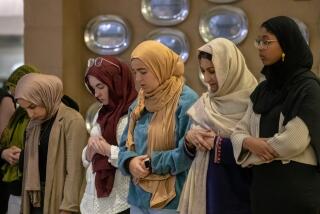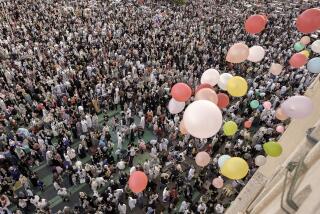Afghan New Year Has New Meaning
PLEASANTON — Friends and relatives have suffered through two decades of war, years of totalitarian oppression and, last week, deadly earthquakes, but Afghan expatriates in California’s Bay Area say they and their kin have more to celebrate than ever this spring.
Just miles from Freemont’s Little Kabul district--the heart of the largest Afghan population in this country--celebrants Saturday observed one of Central Asia’s oldest traditions, Now-Ruz, or Afghan New Year.
Though past celebrations have been punctuated by stories of human struggle back home, Afghan immigrants said they are unusually hopeful now that the Taliban and its restrictions have been removed.
They pointed out that this is the first time in years that their friends and relatives could celebrate the occasion in Afghanistan.
“This is as Afghani as it gets,” said Arash Obadai, 25. “The fact that we could only celebrate here in the United States was very sad. There’s something very significant about it this year, because finally, or hopefully, we have a democratic government.
“With all the world’s attention focused on Afghanistan, we’re hoping something good will come out,” Obadai said.
Nil Ufar, a 23-year-old Hayward resident and a member of the Society of Afghan Professionals, agreed. “Now-Ruz is about a new year, and I really hope this is the start of a new year in Afghanistan.
“I was in Afghanistan two weeks ago,” Obadai said, “and it was amazing to see hope in people’s eyes. After 23 years of war, I expected to see only trauma and fear, and I saw the exact opposite.”
Now-Ruz falls on March 21, but organizers of the event said they couldn’t book space at the Alameda County Fairgrounds in Pleasanton any earlier than Saturday.
The daylong celebration, which is sponsored by the Afghan Center in Fremont, was expected to draw up to 12,000.
Thick crowds of visitors were greeted by dozens of vendors selling an array of Afghan delicacies, teas, silver and lapis jewelry, richly decorated rugs, Afghan music and clothing.
In many cases, women either wore or purchased brightly colored Afghan dresses--dresses commonly worn prior to weddings and decorated with intricate gold embroidery, small mirrors, coins and beads.
As children flew a kite nearby, caterer Farida Rahimi, 25, of Union City, dipped a long-handled ladle into a steaming caldron of shurwa kala, or head soup. As she stirred the thick, yellow broth, large chunks of beef, tongue and stomach rose and sank in the mixture.
Behind her, children swarmed over an assortment of geeleebee--a deep-fried and honey-covered confection that resembles a coiled rope and is eaten with tea. “You need to have a really sweet tooth to eat those,” said Rahimi, who was born in Mazar-i-Sharif.
Jelani Gholam, 38, a native of Kabul, exhibited carpets, landscapes and portraits painted by his brother on scraps of cardboard, drapery and other handy materials.
Gholam said his brother had moved to Pakistan to paint because the Taliban had banned the display of such artwork.
“That’s why I think this new year is so important,” Gholam said. “Under the Taliban, you couldn’t even display artwork like this. Not only would you be injured, but the work would be damaged and destroyed.”
Among a collection of his brother’s paintings was a watercolor on ragged paper of the statues of Buddha that once stood in a Bamiyan cliff side before being dynamited by the Taliban.
The event was also a contrast in cultures. As women knelt on prayer mats behind the music stage and lowered their foreheads to the ground, boys tossed around a football and argued over downs and yards.
Near the music stage, Zia Pohyar, 40, a Kabul native who lives in San Jose, unfurled an expansive wool blanket on a spot of grass. His wife, children and mother assembled a collection of pillows, mats, coolers and canteens.
Dressed in the long-tailed shirt and pantsuit known as a parantomban, the warehouse supervisor said the celebration was the one time of the year he could surround himself with Afghans.
“We’re so scattered in California, I rarely see another Afghan during the day,” Pohyar said.
“When I do meet one, my face gets bright. It’s one of my homeland boys.”
More to Read
Sign up for Essential California
The most important California stories and recommendations in your inbox every morning.
You may occasionally receive promotional content from the Los Angeles Times.











